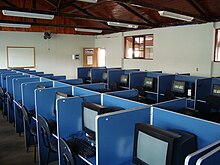
Asynchronous learning is a general term used to describe forms of education, instruction, and learning that do not occur in the same place or at the same time. It uses resources that facilitate information sharing outside the constraints of time and place among a network of people.[1] In many instances, well-constructed asynchronous learning is based on constructivist theory, a student-centered approach that emphasizes the importance of peer-to-peer interactions.[2] This approach combines self-study with asynchronous interactions to promote learning, and it can be used to facilitate learning in traditional on-campus education, distance education, and continuing education. This combined network of learners and the electronic network in which they communicate are referred to as an asynchronous learning network.[1]
Online learning resources that can be used to support asynchronous learning include email, electronic mailing lists, threaded conferencing systems, online discussion boards, wikis, and blogs. Course management systems have been developed to support online interaction, allowing users to organize discussions, post and reply to messages, and upload and access multimedia.[3] These asynchronous forms of communication are sometimes supplemented with synchronous components, including text and voice chat, telephone conversations, videoconferencing, and even meetings in virtual spaces such as Second Life, where discussions can be facilitated among groups of students.[3]
- ^ a b Mayadas, F (March 1997), "Asynchronous learning networks: a Sloan Foundation perspective", Journal of Asynchronous Learning Networks, 1.
- ^ Wu, D; Bieber, M; Hiltz, S (Fall 2008), "Engaging students with constructivist participatory examinations in asynchronous learning networks", Journal of Information Systems Education, 19 (3): 321–30.
- ^ a b Bourne, JR (September 1998), "Net-learning: strategies for on-campus and off-campus network-enabled learning", Journal of Asynchronous Learning Networks, 2 (2).